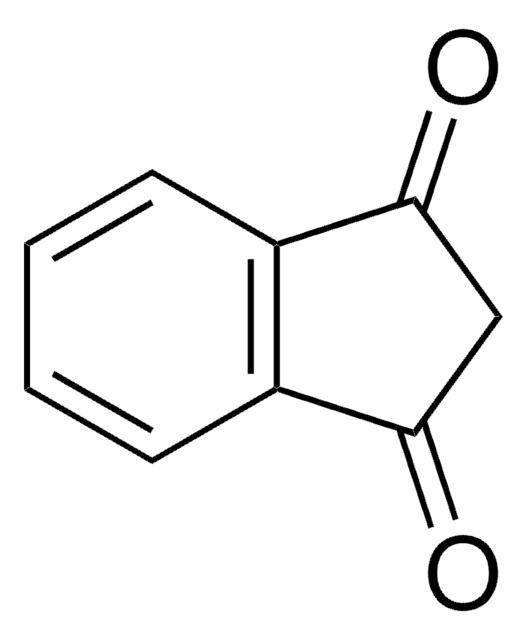38490
5,5-Dimethyl-1,3-cyclohexanedione
for HPLC derivatization, for the determination of aldehyde formaldehyde, ≥99.0%
Synonym(s):
Dimedone, Methone
Sign Into View Organizational & Contract Pricing
All Photos(1)
About This Item
Linear Formula:
(CH3)2C6H6(=O)2
CAS Number:
Molecular Weight:
140.18
Beilstein:
471489
EC Number:
MDL number:
UNSPSC Code:
12164500
PubChem Substance ID:
NACRES:
NA.21
Recommended Products
grade
for HPLC derivatization
Quality Level
Assay
≥99.0% (GC)
≥99.0%
quality
for the determination of aldehyde formaldehyde
mp
146-148 °C (lit.)
application(s)
general analytical
SMILES string
CC1(C)CC(=O)CC(=O)C1
InChI
1S/C8H12O2/c1-8(2)4-6(9)3-7(10)5-8/h3-5H2,1-2H3
InChI key
BADXJIPKFRBFOT-UHFFFAOYSA-N
Looking for similar products? Visit Product Comparison Guide
General description
5,5-dimethyl-1,3-cyclohexanedione (Dimedone) is basically a highly sensitive and very specific reagent used for the determination of aldehydes. It is highly advantageous as it is environment friendly, give high yields and is a simple workup procedure.
Application
5,5-dimethyl-1,3-cyclohexanedione may be used in condensation reaction with aromatic aldehyde in ethylene glycol. It may be also be used in trace analysis of aldehydes by HPLC.
Storage Class Code
11 - Combustible Solids
WGK
WGK 2
Flash Point(F)
Not applicable
Flash Point(C)
Not applicable
Personal Protective Equipment
dust mask type N95 (US), Eyeshields, Gloves
Choose from one of the most recent versions:
Already Own This Product?
Find documentation for the products that you have recently purchased in the Document Library.
Customers Also Viewed
Solid-State Condensation Reactions Between Aldehydes and 5, 5-Dimethyl-1, 3-cyclohexanedione by Grinding at Room Temperature.
Tong-shou J
Synthetic Communications, 35 (17), 2339-2345 (2005)
Jesse C Patterson et al.
Cell systems, 8(2), 163-167 (2019-02-25)
Although elevated levels of reactive oxygen species (ROS) have been observed in cancer cells and cancer cells aberrantly proliferate, it is not known whether the level of reactive oxygen species and the accumulation of oxidative damage to macromolecules vary across
Trace analysis of aldehydes by reversed-phase high-performance liquid chromatography and precolumn fluorigenic labeling with 5, 5-dimethyl-1, 3-cyclohexanedione.
Kenneth M
Journal of Chromatography A, 256, 243-252 (1983)
S N Lavergne et al.
The Journal of pharmacology and experimental therapeutics, 331(2), 372-381 (2009-08-12)
Antigen-presenting cells (APC) are thought to play an important role in the pathogenesis of drug-induced immune reactions. Various pathological factors can activate APC and therefore influence the immune equilibrium. It is interesting that several diseases have been associated with an
Kimberly J Nelson et al.
Methods in enzymology, 473, 95-115 (2010-06-02)
Reversible thiol modification is a major component of the modulation of cell-signaling pathways by reactive oxygen species. Hydrogen peroxide, peroxynitrite, or lipid hydroperoxides are all able to oxidize cysteines to form cysteine sulfenic acids; this reactive intermediate can be directly
Our team of scientists has experience in all areas of research including Life Science, Material Science, Chemical Synthesis, Chromatography, Analytical and many others.
Contact Technical Service











